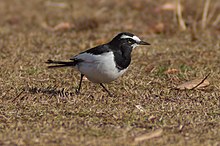Japanese wagtail
| Japanese wagtail | |
|---|---|

| |
| In Japan | |
| Scientific classification | |
| Domain: | Eukaryota |
| Kingdom: | Animalia |
| Phylum: | Chordata |
| Class: | Aves |
| Order: | Passeriformes |
| Family: | Motacillidae |
| Genus: | Motacilla |
| Species: | M. grandis
|
| Binomial name | |
| Motacilla grandis Sharpe, 1885
| |
The Japanese wagtail (Motacilla grandis) is a species of bird in the pipit and wagtail family Motacillidae. It is native to Japan and Korea.
Description
[edit]The Japanese wagtail is about 20 cm long. The sexes look similar; they have white underparts and black upperparts, throats, and backs. Their supercilia are also white. They have black beaks and dark grey legs and feet. The plumage of a juvenile is greyer than that of an adult.[2]
Taxonomy and systematics
[edit]The bird's Latin species name, grandis, means large.[2]
Conservation
[edit]The Japanese wagtail is classed as a species of least concern by the IUCN. It has a stable population.[1]
Behavior
[edit]Diet
[edit]The Japanese wagtail eats insects.[2]
Roosting
[edit]Large groups of Japanese wagtails roost together in trees.[2]
Breeding
[edit]Nests are built in cavities near water. The parents both look after the eggs and chicks. Four to six eggs are laid in each clutch.[2]
Distribution
[edit]It is native to Japan and Korea. Vagrant birds have been recorded in Taiwan, eastern China and far-eastern Russia. It lives in inland wetlands, on arable land and in urban areas.[1]
References
[edit]- ^ a b c BirdLife International (2018). "Motacilla grandis". IUCN Red List of Threatened Species. 2018: e.T22718360A132117451. doi:10.2305/IUCN.UK.2018-2.RLTS.T22718360A132117451.en. Retrieved 11 November 2021.
- ^ a b c d e "Japanese Wagtail". Birds of the World. Archived from the original on 2020-01-02.

